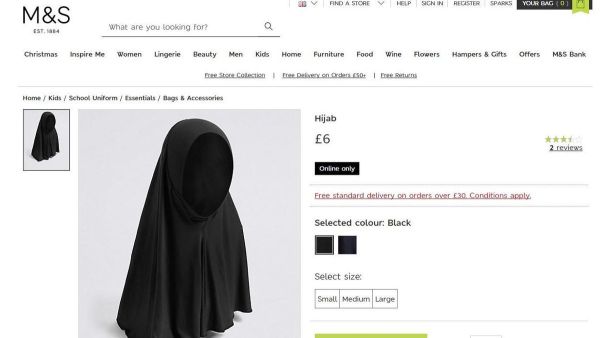Marks & Spencer customers are threatening to boycott the store for stocking hijabs in its school uniform section.
The company's social media pages have been flooded with angry messages regarding the hijabs, which are on sale for £6 ($8) in their 'School Essentials' section.
Dozens of disgruntled customers say they will not use the store until the black headscarf is removed from stock.
Lorraine Smith wrote: 'Disgusting. How could you profit from something that promotes degradation to woman and children? It's obscene!
'For a company struggling with profits, bad move.
'I and many others will boycott until it is removed. Unbelievable.'
Melissa Turnbull, from Renfrewshire in Scotland, posted on the store's Facebook page: 'Why are you selling burkas for primary aged girls? Have you lost the plot?
'Covering four-year-old is part of a disgusting sexualisation of children perpetrated by the cult of Islam and has no place in the UK.
'I won't be shopping in your stores until you stop this.'
Cassy Simmons-Thornton, from London, added: 'Can you please explain why you are selling a hijab for young children and helping the oppression of women from a young age?
'A lot of people will now boycott your stores.'
Julie Raven, from Brighton, commented: 'Why are you selling hijabs for infant-school-aged girls?
'Are you implying that their bodies are immodest and may inflame men? You need to take a good look at yourselves.'
Addressing the complaints on their Twitter page on Thursday, Marks & Spencer wrote: 'We provide bespoke uniforms for 250 schools across the country.
'They tell us which items they need as part of their school uniform list, and for a number of schools this year, they requested the option of the hijab.'
The LBC Radio presenter and founder of the Quilliam Foundation Maajid Nawaz said that M&S has reverted to 'medievalism' by including a child-size hijab in the school-wear category.
Nawaz wrote: 'It's their right to choose profit over values. But it's our right to shame them for doing so.
'Little girls are told it is "immodest" to show their hair. And blessed be the fruit.
'To be clear, these are stocked for little girls as young as 3 years old.
'Hijab is still imposed (only on women) by law in Iran and Saudi Arabia, and many other countries. This is gender apartheid. Marks and Spencer are free to sell confederate flag tee-shirts too, but I bet they never will.'
'Blessed be the fruit' is a reference to the greeting used by the female characters in Margaret Atwood's dystopian novel The Handmaid's Tale, in which women are kept as slaves useful only for bearing children and forbidden to use their own names.
Nawaz, who is himself Muslim, continued: 'Hijab is still imposed (only on women) by law in Iran and Saudi Arabia, and many other countries. This is gender apartheid'
He has previously called the hijab a 'monstrosity' and the 'uniform of medieval patriarchal tyranny'.
The practice of veiling some part of the head or face has a history in European, Asian, and African societies and appears in varied forms in Judaism, Christianity and Islam.
The hijab is a garment worn by Muslim women when they not in the company of their immediate family and usually covers the hair, neck and the top part of the chest.
It is seen as a symbol of modesty by people who wear them.
Most Islamic scholars agree that the hijab is only obligatory for females once they reach puberty.
Hijabs are different from other Islamic veils like the burka and niqab, which both cover the face.
The niqab covers the whole face leaving a gap for the eyes, while the burka leaves only a mesh screen to see through.
Former foreign secretary Boris Johnson caused a separate online debate in August when, in an article defending Muslim women's right to wear the burka, he said that they resemble 'letter boxes' and 'bank robbers'.
This article has been adapted from its original source.








